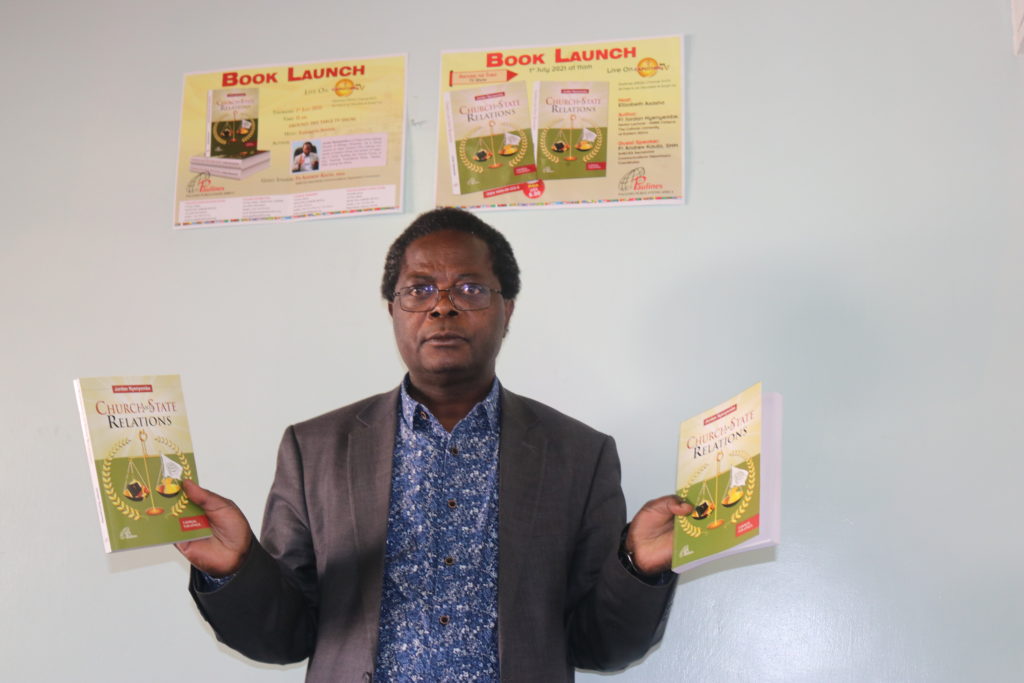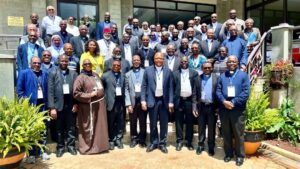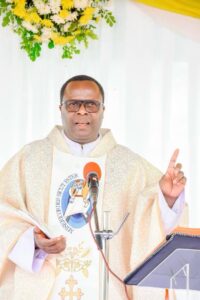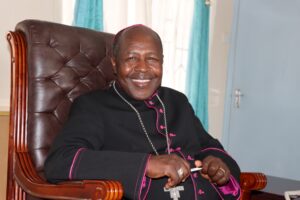KENYA: Church and State Relations: Author Highlights Correlation Between Faith and Politics

Fr. Dr. Jordan Nyenyembe
Sr. Jecinter Antoinette Okoth, FSSA
Many people including Christians, non-Christians and religious feel incompetent to address political issues and conceive politics as a “dirty game yet it is too precious to be left to politicians,” author of a new book ‘Church and State Relations’ discloses hours before its launch Thursday, July 1.
In an interview with AMECEA Online, Fr. Dr. Jordan Nyenyembe an African pastoral theologian and a senior lecturer at the Catholic University of Eastern Africa (CUEA) Eldoret Campus, narrates that the two institutions are always at loggerheads yet “each is autonomous and has its role to play for the common good of all.”
According to Fr. Nyenyembe, Vatican II document Gaudium et Spes which was promulgated by Pope Paul VI in 1965 and focuses on the pastoral constitution on the Church in modern world, “politics is a noble vocation…and all Christians must be aware of their own specific vocation within the political community and participate in politics as an important role in the Church.”
“Politics define the welfare of the people, and the Church’s mission is to render services to humanity and entire creation in favor of justice, peace and love,” Fr Nyenyembe in charge of AMECEA Gaba Publications’ African Ecclesial Review (AFER) journal, disclosed and narrated further, “She must therefore interpret the signs of time using God’s lenses and be a bold witness to the gospel, ready to announce and denounce evils and make recommendations to the State.”
“The Church should therefore not withdraw from the world but serve it both by being the sign of God’s salvation and by continuously reminding of what the world is still not,” adds the chief-editor of AFER publications.
Recounting his inspiration to write the newly launched book, Fr. Nyenyembe who has been a lecturer of Pastoral Ministry and Management, Religious Dialogue and Church and State relations at CUEA’s Eldoret Campus since 2013 narrates that there has been lack of reference books for Church and State relations especially in the African perspective. At the same time, students are always concerned why some seminaries do not delve in the course (Church and State relations) yet it is a pertinent issue in the modern Church.
Additionally the Tanzanian-born cleric from Mbinga Diocese underscores that it is 10 years since the publication of Pope Benedict XVI’s Post-Synodal Apostolic Exhortation Africae Munus on the Church in Africa in service to reconciliation, justice and peace and “I felt that not much has been done to fulfill what is in the exhortation.”
The author of the book whose launch was televised on Thursday July 1, 2021 says Pope Benedict XVI’s exhortation emphasizes political role for Christians, good governance and how the Church in Africa is entering new Pentecost.”
He reminded Christian believers during the interview that “bringing faith into politics is not optional and that faith is not a private matter. Hence, to have holy politicians in Africa, Christians need to engage in politics and encourage bringing the kingdom of God through justice, peace and love.”
Reflecting on how States originated the cleric said, “Before the fall of Adam and Eve harmony existed among human beings with nature and God hence no laws or governments were needed, but later after the fall, discord followed and political states were needed to regulate human society.”
Even though conflicts normally exist between Church and State the author argues, “It is important to understand that each institution has a significant role to play while respecting its jurisdiction and autonomy.”
“The State should understand that when the Church speaks of evil in the society, she does not address an individual and that it is done in the service of truth since it is the role of the Church to advocate for the people and be the voice of the voiceless.”
Fr. Dr. Nyenyembe disclosed that the Church needs to empower Justice and Peace commissions to be vibrant in matters of politics and to offer civic education and form conscience of Christian. At the same time, the Religious need to be concerned about the political world and through “their vows sanitize politics, add its flavor and open the eyes of politicians to do what is expected of them.”
While highlighting the relationship between faith and politics, the author notes that the eight-chapter book conceives human problem to create theological questions that need pastoral answers.
Speaking during the launch, AMECEA Social Communications Coordinator, Fr. Andrew Kaufa echoed the author’s message that many times people view politics as a dirty game and “have left the field to people who are probably worse than us and that later we complain that our leaders are not doing well.”
He emphasized it is time “Christians see a healthy relationship between Church and State, Christianity and politics.” At the same time he acknowledges a blurb of the book that the work by Fr. Nyenyembe encourages closer collaboration between the Church and State,” noting that “Perhaps there has never been a relationship that is increasingly more misunderstood and undervalued.”
Asked about the relevance of the book in the context of the launch of the book and concerns about lack of a reading culture in most African countries, Sr. Olga Massangu, a member of t Daughters of St. Paul (FSP) congregation said, “Readership provides for critical thinking.”
She added that the Church has the duty to form the conscience of the people by promoting a reading culture that helps people to develop critical thinking.”


